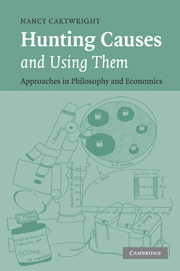Book contents
- Frontmatter
- Contents
- Acknowledgements
- Introduction
- Part I Plurality in causality
- Part II Case studies: Bayes nets and invariance theories
- 5 Preamble
- 6 What is wrong with Bayes nets?
- 7 Modularity: it can – and generally does – fail
- 8 Against modularity, the causal Markov condition and any link between the two: comments on Hausman and Woodward
- 9 From metaphysics to method: comments on manipulability and the causal Markov condition
- 10 Two theorems on invariance and causality
- Part III Causal theories in economics
- Bibliography
- Index
6 - What is wrong with Bayes nets?
Published online by Cambridge University Press: 03 December 2009
- Frontmatter
- Contents
- Acknowledgements
- Introduction
- Part I Plurality in causality
- Part II Case studies: Bayes nets and invariance theories
- 5 Preamble
- 6 What is wrong with Bayes nets?
- 7 Modularity: it can – and generally does – fail
- 8 Against modularity, the causal Markov condition and any link between the two: comments on Hausman and Woodward
- 9 From metaphysics to method: comments on manipulability and the causal Markov condition
- 10 Two theorems on invariance and causality
- Part III Causal theories in economics
- Bibliography
- Index
Summary
The basic question: can we get to causality via bayes nets?
Probability is a guide to life partly because it is a guide to causality. Work over the last two decades using Bayes nets supposes that probability is a very sure guide to causality. I think not, and I shall argue that here. Almost all the objections I list are well known. But I have come to see them in a different light by reflecting again on the original work in this area by Wolfgang Spohn and his recent defence of it in a paper titled ‘Bayesian Nets Are All There Is to Causality’.
Bayes nets are directed acyclic graphs that represent probabilistic independencies among an ordered set of variables. The parents of a variable X are the minimal set of predecessors that render X independent of all its other predecessors. If the variables are temporally (or causally) ordered, we can read the very same graph as a graph of the (generic-level) causal relations among the quantities represented, it is maintained. This commits us to the causal Markov condition described below, which is a relative of Reichenbach's claim that conditioning on common causes will render joint effects independent of one another. It is also usual to add an assumption called faithfulness or stability as well as to assume that all underlying systems of causal laws are deterministic (plus the causal minimality condition, which I will not discuss).
- Type
- Chapter
- Information
- Hunting Causes and Using ThemApproaches in Philosophy and Economics, pp. 61 - 79Publisher: Cambridge University PressPrint publication year: 2007

